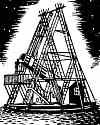 He made several this way and with each improved model he opened up new
fields for observation and study. When he was 43, after several
unsuccessful attempts, he succeeded in casting a 36-inch mirror for a
new reflecting telescope.
He made several this way and with each improved model he opened up new
fields for observation and study. When he was 43, after several
unsuccessful attempts, he succeeded in casting a 36-inch mirror for a
new reflecting telescope. This opened up an entirely new world to him and he discovered the planet later named Uranus. For this discovery he was elected a fellow of the Royal Society and the next year George III appointed him Royal Astronomer. Herschel now had to make a very difficult decision. He was torn by an inner conflict. Should he devote his time to music or should he do astronomical research? But he made his decision and on Whit Sunday, 1782, he played an anthem of his own composition and said good bye to his pupils. Now at the age of 45 Herschel was free to devote all his time to his chosen career and in the years that followed he made scientific history. His observations and analysis led another astronomer to say, "As a scientific conception it is perhaps the grandest that has ever entered into the human mind." |








